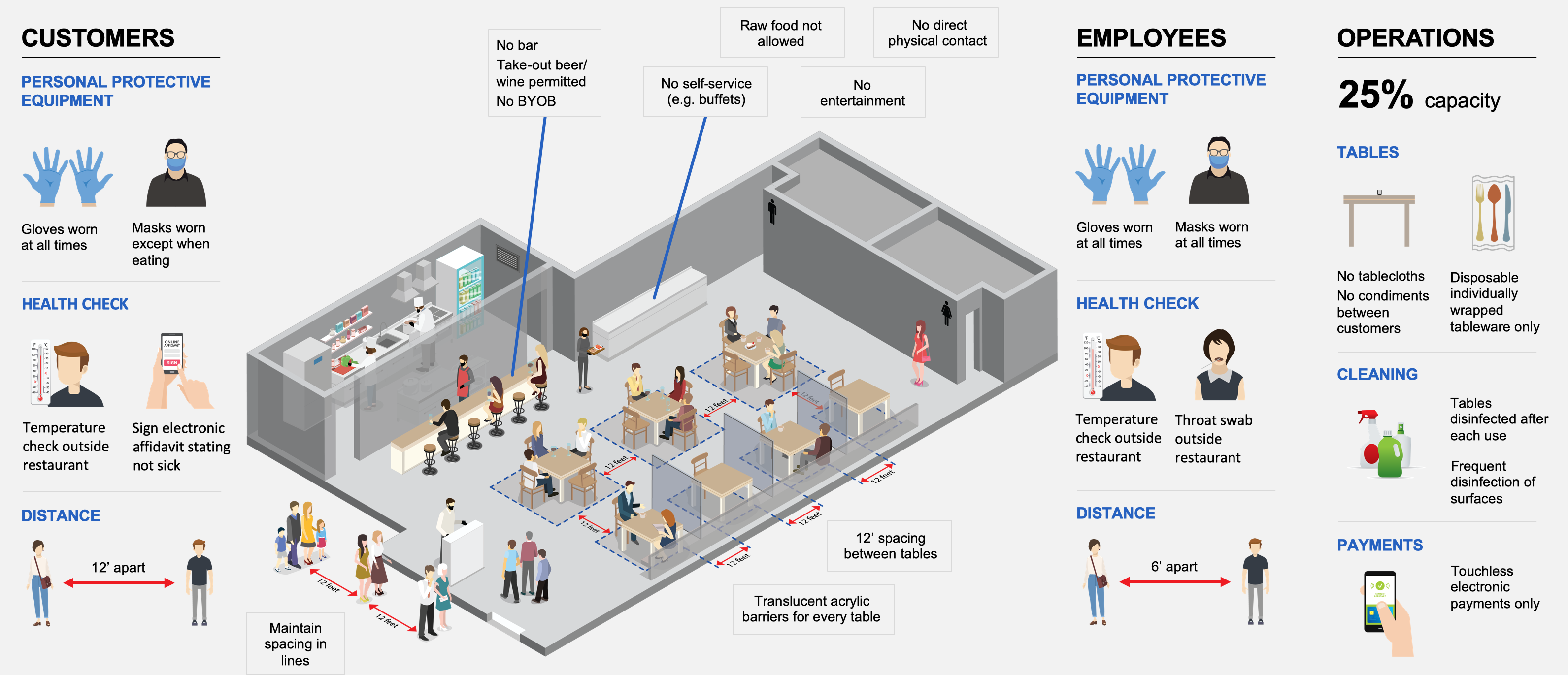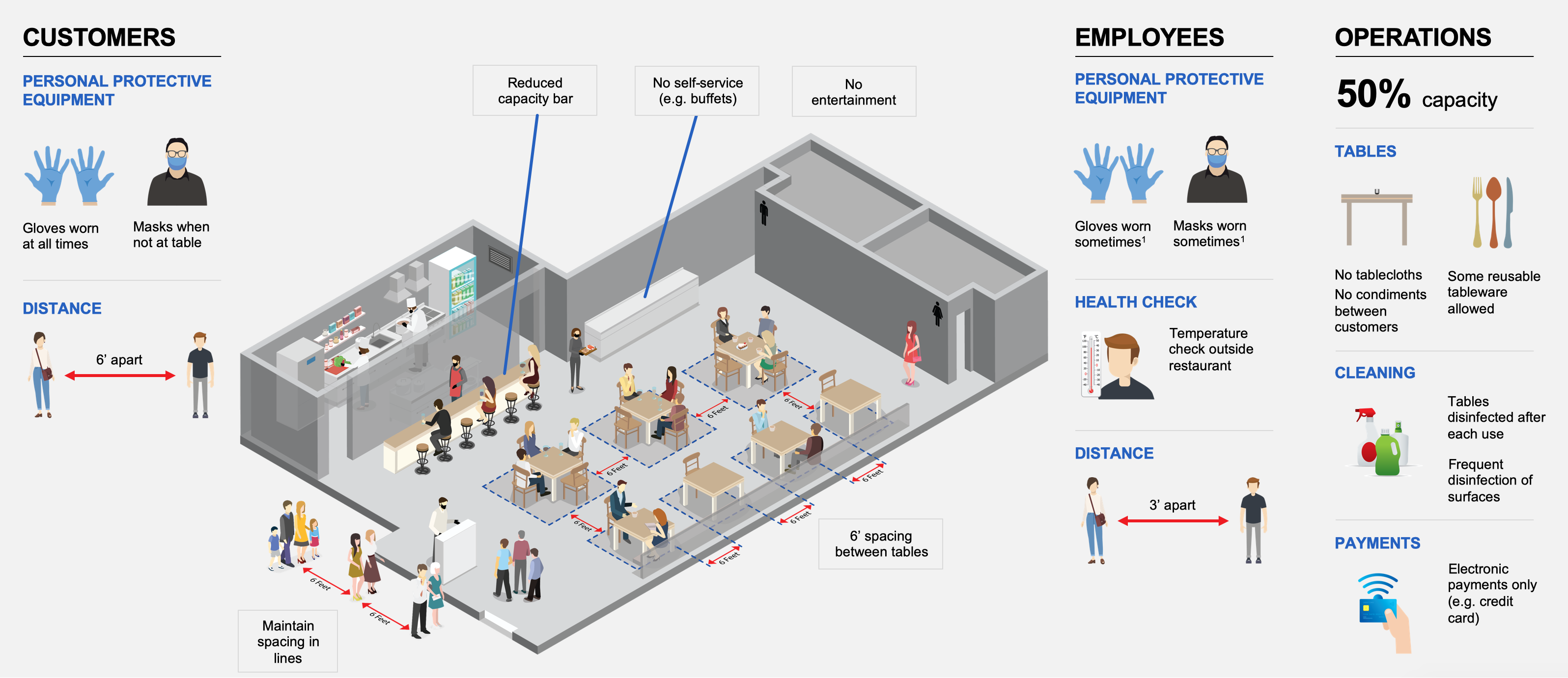Resources specific to small business owners in food services
Support from other corporations
Links to resources that provide support in this industry
The Greg Hill Foundation has teamed up with Samuel Adams to support those from the Massachusetts restaurant industry who have been impacted by the Covid-19 closures. Goal is to provide $1,000 grants to as many qualifying grantees as possible.
Restaurants can now turn their parking spaces into revenue-generating real estate with OneDine’s scan-to-order and scan-to-pay features. OneDine is a free Tap & Pay touchless payment system that helps restaurants turn their parking lots into an Order, Pay, and Pick-up venue at no charge.
Yelp services, upgrades and advertising for free - restaurants and nightlife businesses that remain open will receive free access to Yelp page upgrades, including Business Highlights and Call To Action, as well as Connect, which will help them communicate timely information to their customers. Restaurants will also receive three months of free access to Yelp Reservations and Waitlist. For restaurant clients that offer delivery and/or takeout, Yelp will provide $100 in free search advertising.
Southern Smoke's Emergency Relief Program provides emergency funding to those employed by or owning restaurants or bars or are employed by a restaurant or bar supplier that are faced with unforeseen expenses that cannot or will not be covered by insurance. We stand with those in our community and are committed to “taking care of our own”.
Application Verification and Award process: Each application will be verified by the Executive Director or a committee of volunteers. Once applications are verified, the application will be distributed to a separate Awards Committee. The Awards Committee will be made up of trusted community members. The Awards Committee will select awardees by vote and will determine the awarded amount to be distributed. All funds granted are subject to taxation to the greatest extent of the law.
Starting Monday, March 30th, Blue Dragon Bos from 3-5 pm will turn into a relief center for any restaurant worker who has been laid off or has had a significant reduction in hours and/or pay. We are offering help for those in dire need of food and supplies. Each night, hundreds of to-go dinners will be available for pick up. Dinners are offered on a first-come, first-serve basis. Limit 1 per person unless there is an emergency situation. We will also have essential supplies on hand for free but will limit how much we can give to provide for as many as possible. We will continue to offer this program until we can no longer financially support the program.
All details:
- Blue Dragon: 324 A Street, Boston MA 02210
- Program will be offered 7 days a week until otherwise notified
- Pick up time is 3-5 pm daily, please bring a valid drivers license or state ID and recent paycheck stub
Through this Fund, grants will be made to restaurant industry employees who have demonstrated being financially impacted by COVID-19, whether through a decrease in wages or loss of employment. These grants will be made on a first-come-first-served basis, subject to availability of funds. 100% of the Fund’s proceeds will go to providing grants to restaurant workers.
Restaurants can now turn their parking spaces into revenue-generating real estate with OneDine’s scan-to-order and scan-to-pay features.
Guests simply drive up to the parking space and scan the QR code from the standing sign with their mobile device. This launches a mobile-friendly web page for the restaurant where the guest can order and pay from their phone, and have the food delivered right to their car.
As part of its #ChefsForAmerica nationwide emergency food relief program, World Central Kitchen is committing to purchasing 1 million meals from local restaurants and delivering those meals directly to Americans that need assistance. WCK is working across America to safely distribute individually packaged, fresh meals in communities that need support – for children and families to pick up and take home, as well as delivery to seniors who cannot venture outside.
Restaurants go through an onboarding process and COVID-19 safety training. WCK issues payment directly to the restaurant and, as a nonprofit, WCK ensures that 100% of all philanthropic donations go directly to meals and the restaurant workers. WCK will engage delivery drivers working for UberEats, DoorDash, GrubHub, and Postmates — all partners in this initiative — putting these drivers back to work distributing meals. Lyft is supporting the initiative with free rides for restaurant workers in Boston, Los Angeles, New York City, Oakland, and Washington, D.C.
BEHIND YOU! is a non-profit charity that provides one-time financial assistance to a qualified restaurant worker in need, due to unexpected illness or injuries. Recipients must have been employed by the same business for at least one year, must have worked for no less than 30 hours per week, must have absence must be verified by Employer, and employer must be an independently-owned business.
This is a grassroots effort to connect people and restaurants in support of our communities.
Rally for Restaurants is a grassroots initiative from restaurant technology providers, public and private companies, restaurant owners and workers, and people everywhere coming together to support the restaurant community in their time of need.
Restaurant workers, delivery workers, drivers and other tipped and service workers who sign up with One Fair Wage and participate in a confirmation interview with one of our organizers will be qualified to receive assistance For starters, verified workes will receive gifts of $213.00 — choosing that amount because $2.13 is the current federal sub-minimum wage.
Similar to government-issued war bonds- the Dining Bond Initiative seeks to bring in immediate cash in exchange for future restaurant purchases. Diners can buy gift certificates sold at a 25% discount ($100 worth of food for a $75 bond) to be redeemed in the restaurant within the next month or two, depending on how individual restaurants decide to honor the bonds. This program is open to all restaurants.
Off Their Plate is an organization working to provide meals to frontline COVID-19 healthcare workers and restore the livelihoods of our restaurant workforce.
Dining at a Distance, created specifically to support food providers during the COVID-19 pandemic, offers dozens of local, community-sourced databases of farms and restaurants that remain open for business.
Other Coronavirus Support
Square: Square is waiving curbside pickup and delivery fees for the next three months. Square Online Store already offers online orders for in-store pickup with no monthly fee.
Grubhub: Zero commission fees and community relief fund
Doordash: Free delivery, zero commission fees for 30 days, and marketing support
Uber: Free delivery, waived signup fees with fast-tracked onboarding for restaurants new to the app
Postmates: Zero commission fees
Fisherman: Fisherman is offering free website services and assistance setting up takeout/delivery for any restaurant for the next six months.
Potential health and safety protocols
Option 1: protocols for 25% capacity

Option 2: protocols for 50% capacity

Business Process Adaptions Checklist
Supply Chain and Operations
Supply Chain
- Contact and review status of suppliers to ensure steady delivery of goods (minimize single points of dependence) and minimize risk of supply disruptions
- Build inventory of scarce supplies
- Request revision of payment timelines and terms for flexible alternatives
- Validate supplier food safety standards
- Limit menus to match what can be predictably sourced
- Substitute frozen products for fresh products when necessary
- Revise purchase orders to align with changes in demand and identify opportunities for selling/donating perishable overstocks
Operations
- Tailor delivery menus to give customers choices in both fresh and prepared foods, potentially offering meal kits that customers can put together at home
Simplify operations to avoid putting further stress on an already-strained workforce (e.g., eliminate complicated menu options)
- Make staffing plan to reflect staged reopening (e.g., kitchen may be fully staffed, wait staff once dine-in allowed)
- Establish contingency staffing measures in case of unexpected issues (child care, transportation, etc.)
- Support workforce applying for unemployment benefits
Service Delivery and Marketing & Sales
Service Delivery
- Ensure online-ordering mechanisms can handle an increase in demand
- Prioritize curb-side pick-up capabilities to allow contactless takeout
- Partner with call centers, delivery aggregators, and other third-party providers to provide delivery capabilities
- Cross train personnel to assist with takeout and delivery
- Reassign in-store employees to assist with delivery operations
Marketing & Sales
- Shift marketing to home-based channels (e.g., social media), sign up for any local-based marketing campaigns, and secure preferred placement in food-delivery apps
- Constantly communicate with customers (especially the most loyal ones) and run frequent “pulse checks” on consumer sentiment and preferences
- Ensure the appropriateness and accuracy of your marketing messages (e.g., in ads emphasizing safety of food delivery or takeout)
- Update and maintain online listings as business adapts (e.g., on Yelp, Google, and Trip Advisor)
- Visibly call out in-store and online safety procedures implemented to reassure customers
Note: Checkpoints have been aggregated from case studies across different countries and US states. Please consider the list as examples of actions; level of importance to contamination containment has not been assigned and is up to business and state/federal public health regulations and recommendations
You must be logged in to post a comment.